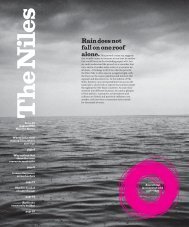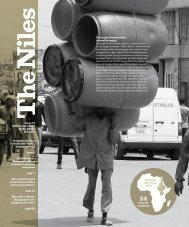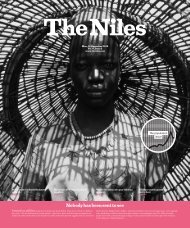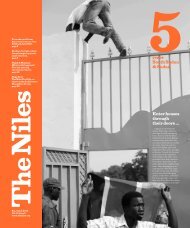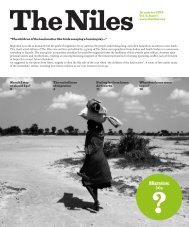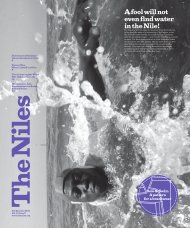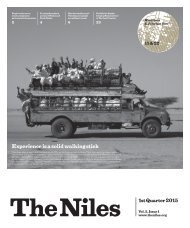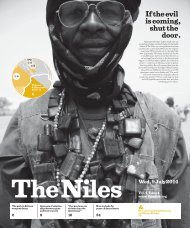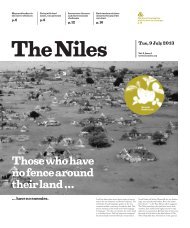We are what we eat
The food we eat literally determines who we are. It influences our physical, mental and even emotional well-being. From Egypt’s Cairo to Burundi’s Gitega, this issue of The Niles attempts to explore the essentials of food: from conflict and food insecurity to the sensory aspects of preparing and eating national dishes.
The food we eat literally determines who we are. It influences our physical, mental and even emotional well-being. From Egypt’s Cairo to Burundi’s Gitega, this issue of The Niles attempts to explore the essentials of food: from conflict and food insecurity to the sensory aspects of preparing and eating national dishes.
You also want an ePaper? Increase the reach of your titles
YUMPU automatically turns print PDFs into web optimized ePapers that Google loves.
“Farmers are
using the programme
to get
various types
of information,
especially poor
and smallholder
farmers can
access information
and start
dialogues with
professionals
on preventing
and reducing postharvest
loss.”
The overall poor post-harvest management across the nation not only
affects the short shelf life of the food grains but also hugely impacts the
overall decline of edible food for consumption for the steadily increasing
population of Ethiopia.
The minimising of post-harvest losses would have a significant and
direct impact on food security in Ethiopia. It would enhance food availability,
and proper post-harvest management would retain the high nutritional
value of crops.
The prevention efforts to reduce post-harvest loss needs comprehensive
work, said Misa Demessei, Crop Value Chain Development Expert at the
Ethiopian Agricultural Transformation Agency (ATA). She explained that
“improved agricultural technologies should be available to the farmer, especially
for those who are small scale holders”.
She continued: “Technology would significantly support farmers to reduce
the traditional way of harvesting. The technologies that we are talking about
are not those of high mechanisation; we are working on adopted technologies
of threshing, winnowing, storage and others. We are doing it in a way that
is accessible and useful for small scale farmers.”
Bekel, the farmer living in the Adea district, said ATA’s support has enabled
him to improve post-harvest management:
“I have been implementing three major tasks to reduce crop loss. Timely
grain collection is the first task. Secondly, I have started using better packaging,
and finally, I have changed the traditional method of crop storage.”
The Agricultural Transformation Agency of Ethiopia (ATA) has launched
mobile phone information programmes for farmers, called ‘8028 Farmer
Hotline’, as part of the strategy of tackling post-harvest crop loss. Through
the hotline, farmers can easily access information related to weather, markets,
and the use of technologies.
“Farmers are using the programme to get various types of information,
especially poor and smallholder farmers can access information and start dialogues
with professionals on preventing and reducing post-harvest loss,” said Misa.
Beware of tricks to steal land
from widows
Land disputes are par for the course in Burundi, but witchcraft
and other tactics can leave bereaved wives with nothing.
Fabien Niyonizigiye
Burundi
Emillienne Sinabikeka is sitting on a chair at the Justice Department
of Kayanza as she awaits her turn to formally submit her claim
on her late husband’s land. Her brothers-in-law have been trying
to deny her of her inheritance.
“I am constantly intimidated by them, and I often receive
death threats,” she said.
Sinabikeka believes her in-laws might have induced her husband’s death
through witchcraft – a commonly held belief in Kayanza.
Florence Ndikumana is the Coordinator of Family and Community
Development Centre in Kayanza and says that cases like Sinabikeka’s are
common. A man’s family members can kick a woman out of a house directly
after her husband has passed away, and then claim that the woman no longer
has ownership of the property.
Land possession has always been a prestigious indicator of a family’s
wealth in the Burundian culture, which is one reason why constant fighting
for land ownership persists amongst Burundian families. Kayanza is the
most populated province in Burundi, and unsurprisingly, it has the highest
percentages of complicated land fighting court cases.
In Kayanza’s commune of Gatara, where the population density is 961
inhabitants per km2, land cases are also widespread. Kayanza’s commune
has a population density of 1000 inhabitants/ km2 and the same cases of
widespread feuds over land ownership are also very common.
Killings, revenge amongst families and targeted witchcraft hunts are all
a result of land disputes The Governor of Kayanza says that over 90 percent
of the cases he receives in his office are related to land disputes.
See how food connects despite
political divisions
Along national borders in the Nile Basin, similarities in food traditions prove
that cultures are far more similar than they are different.
Elzahraa Jadallah
Khartoum, Sudan
Human connection between neighbouring nations knows no
boundaries. This can be witnessed by shared cultures, traditions
and ways of life among many groups in the Nile Basin. While they
may be divided by political borders, they still live together as one
civilisation, proving that social ties are stronger than politics.
Besides clothing, rituals, traditions and spiritual practices, food is proof
of a significant cultural connection. The traditional meals made of natural and
local ingredients are almost the same for the local people living along the
borders in each country in the basin.
In Sudan, a country vast and diverse, the cuisine varies depending on
the region. But in the north and down to the centre there are many similarities
between Sudan and Egypt in terms of food choices.
Since northern and central Sudan mostly adopt Arab culture, they have
a lot of meals in common, not just with Egypt, but with the entire Middle East.
Most of the well-known Arabic dishes are present in almost every home in
those parts, including foul and falafel.
Foul is made of fava beans, boiled with salt and served with chopped
onions, cheese and sesame or peanut oil, and sometimes with dressings like
garlic or tahini. In Khartoum, many people prefer to have foul mixed with
pieces of bread and other ingredients – they call it “boash” and it is college
students’ favourite meal.
Falafel are fried ground chickpea balls with herbs and other kinds
of seasoning. Foul and falafel together make a great breakfast meal.
However, in the northern and central parts of Sudan, they have their
own special meals like qurasa, which is made from flour in a way similar
to making crepes. Qurasa can be eaten with different sorts of stews and
8
Left: A woman prepares kisra,
a thin, fermented bread.
Right: Assorted stews and sauces
served along with qurasa.
Photos: Elzahraa Jadallah
TN14_20191203_II.indd 8 2019/12/03 10:08









